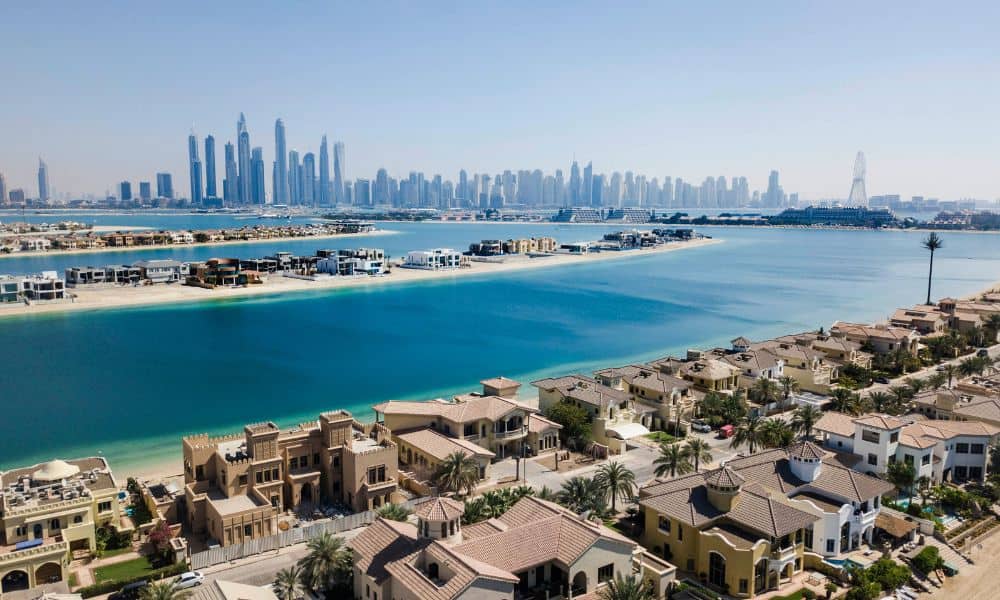Our Essential Moving to Dubai Checklist For A Smooth Transition From the UK

by Hayley
Embarking on a move to Dubai? Equip yourself with the necessities of relocating by diving into our moving to Dubai checklist. This no-nonsense guide cuts through the clutter, focusing sharply on visa procedures, accommodation tips, and key financial actions.
Prepare to navigate your journey with confidence, armed with a checklist that addresses your relocation essentials without unnecessary detail upfront.
Should you need support in removals to Dubai or the UAE, Simpsons International Removals is here to assist. We frequently aid individuals and families in moving to their dream destination. Continue reading to discover the vital checklist for your move to the UAE.
1. Visa and Residency Requirements
When moving abroad, understanding visa and residency requirements is crucial. Here are some important points to keep in mind for UK passport holders moving to Dubai:
-
- UK passport holders are granted a 60-day entry to Dubai
- They can also request a 10-day grace period for extensions if needed
- To relocate permanently, you’ll need a residence permit, which includes various visas and work permits.
Whether you’re planning to work or retire in Dubai, understanding these requirements will smooth your transition. Make sure to go through the Dubai checklist to ensure a hassle-free experience.
Work Permit
If you’re looking to work in Dubai, be aware that:
-
- It’s illegal to work without a work permit.
- As a UK citizen, you must be sponsored by an employer who will apply for your residency visa.
- This permit is initially valid for 30 days and can be extended for another 30 days.
- Your employer sponsorship is crucial in securing your employment contract and, subsequently, your stay in Dubai.
UAE Residency Visa
Once you’ve secured employment, your next step is to apply for a UAE residency visa, also known as a residence visa. To do this, you must:
-
- Contact your sponsor or the local General Directorate of Residency and Foreign Affairs.
- Have a valid passport with at least 6 months remaining before expiration.
- Pay a refundable deposit of AED 5000 per person required for the application.
Keep in mind that the UAE visa application fees amount to around AED 360, and the medical tests costs are between AED 200-300.
Emirates ID Card
Once your visa application is underway, don’t forget to apply for your Emirates ID card. This mandatory identification card is used for accessing government services, voting in elections for UAE citizens, and also serves as a travel document within the GCC.
The processing fee is AED270 (£60.87), but if you’re in a hurry, a fast-track service called ‘Fawri’ can issue the ID within 24 hours.
2. Housing and Accommodation
Once you’ve got your paperwork in order, it’s time to find your new home.
Whether you’re renting or buying, it’s essential to understand the nuances of the Dubai housing market and consider your minimum monthly salary.
The cost of a one-bedroom apartment in Dubai’s city centre averages a monthly rent of approximately AED 7,068.17, while one located outside the city centre costs around AED 4,142.20.
In addition to the rent, you’ll need to factor in a variety of fees such as a property purchase deposit, a security deposit, agency fees regulated by the real estate regulatory agency, and monthly DEWA bills.
Renting
If you’re renting, you’ll need to understand the rental market in Dubai. Prices vary depending on location, property size, and amenities. For instance, in Jumeirah Lakes Tower (JLT), a popular expat residential area, the average annual rental price for a one-bedroom apartment is approximately AED 74,522, translating to a monthly cost of about AED 6,210.2.
It’s crucial to research the market and understand what others are paying for similar properties to negotiate confidently and avoid overpaying.
Buying
If you’re looking to buy property in Dubai, you’ll find designated areas for foreign ownership, including Dubai Marina, Palm Jumeirah, and Downtown Dubai. When buying property in Dubai, it’s strongly recommended to transact through regulated real estate agents to avoid scams.
Furthermore, Dubai’s real estate market observed over a 7% rise in value for prime areas in the previous year, suggesting potential for future price growth.
3. Banking and Finances
Financial planning is a key aspect of your move to Dubai. Expats in Dubai do not pay income tax on salaries or wages but may be subject to foreign taxation laws of their home country.
Additionally, Dubai has a value-added tax (VAT) rate of 5%, which impacts the cost of goods and services.
Opening a Bank Account
Opening a bank account in Dubai is a straightforward process. Expats can open a bank account by selecting a bank, choosing the account type, filling out an application form, and submitting the required documents such as a passport, proof of employment, a letter from the employer, and an Emirates ID. Be aware of additional fees beyond the account maintenance, such as charges for international money transfers.
Tax Considerations
While there is no income tax on earnings in the UAE, Dubai has implemented a 5% Value-Added Tax (VAT) on most goods and services since January 2018. Basic food items, healthcare, and education are exempt from VAT, whereas international transportation and investment in precious metals are taxed at a 0% rate.
Money Transfers
When it comes to transferring money internationally, there are several options at your disposal. Online international payment services like:
-
- Wise
- PayPal
- CurrencyFair
- Moneycorp
enable customers to send dirhams to overseas bank accounts from the UAE. Be mindful that UAE banks typically charge a service fee for international money transfers, which can take up to five working days to process.
4. Healthcare and Insurance
Dubai offers world-class healthcare facilities, both public and private. However, it’s mandatory for all residents, including expats, to have medical insurance in Dubai.
The estimated annual cost for private medical insurance in Dubai is around £2,200 or approximately AED 5,500.
Mandatory Medical Insurance
In Dubai, all residents, including expats, are required by the Dubai Health Authority to have medical insurance coverage. Employers are required to provide health insurance cover for all their expat employees.
The Essential Benefits Plan (EBP) provides basic medical care coverage for expats with lower salaries, children, domestic staff, and non-working residents.
Navigating the Healthcare System
Navigating the healthcare system in Dubai involves understanding the options available. Although both public and private healthcare services exist, expats tend to use private facilities due to shorter wait times and a wider range of available specialists.
Public hospitals offer emergency, inpatient, and outpatient services with English-speaking staff, and expats can access these services by applying for a health card.
5. Education and Schools
If you’re moving with your family, considering the education system in Dubai is crucial. Dubai offers a diverse range of educational options, from local schools to international institutions.
Local Schools
Local schools in Dubai offer a variety of curricula to accommodate the diverse expat community. Expat parents can choose between state schools where the language of instruction is Arabic, and private schools that often have waiting lists.
School fees in Dubai range from approximately AED 8,000 to AED 97,000 annually, with top schools generally being more expensive.
International Schools
International schools in Dubai mirror the educational experiences and qualifications of their respective countries. These schools provide multi-language instruction and tailored curricula to various nationalities, and commit to inclusive education with provisions for students with special educational needs. However, tuition fees for international schools vary significantly depending on the curriculum and grade level, which can lead some expat parents to consider homeschooling as an alternative due to high costs.
6. Transportation and Driving
Getting around in Dubai is relatively easy, thanks to its well-developed public transportation system. If you prefer driving, you’ll need to convert your UK driving licence to a Dubai driving licence. This process is necessary to legally operate a vehicle in Dubai.
Public Transport
Dubai’s public transportation system includes:
-
- The Dubai Metro, a fully automated rail system with two main lines, the Red and the Green, that provide efficient transit across the emirate
- Buses
- Taxis
- Tram
- Various marine transport options
Driving Licence
Driving in Dubai offers freedom and flexibility. However, you can’t just hop in a car with a UK driving licence. You’ll need to convert your UK licence to a Dubai driving licence. This process involves:
-
- Submitting the original and copy of your UK licence
- Emirates ID
- Passport with visa page
- Passport photographs
- Undergoing an electronic eye test.
7. Relocating with Pets
If you’re planning to bring your furry friends along, it’s important to understand the requirements for bringing pets to Dubai. Pets relocating to Dubai must:
-
- Have a valid import permit from the United Arab Emirates Ministry of Climate Change & Environment
- Be microchipped
- Have a DEFRA Export Health Certificate confirming they meet UAE’s entry requirements.
8. Preparing for the Move
Finally, let’s talk about the move itself. When planning a move to Dubai, it’s crucial to set a budget that accounts for international moving costs and potential duty taxes on new items brought into the country.
Setting a Moving Budget
Setting a moving budget is crucial to ensure a smooth transition. Be sure to get quotes from at least 3 specialist international removals companies to get an accurate estimate for your volume of belongings.
Packing and Shipping
When it comes to packing and shipping, carefully consider your options. You can choose between air freight for quick transit times and sea freight for more economical, though slower, service.
It’s also important to ensure that furniture and fragile items are well-protected for the journey.
Are you looking to relocate to Dubai & UAE from the UK?
Dubai is a vibrant city that offers a wealth of opportunities for expats. While moving to a new country can seem daunting, breaking down the process into manageable tasks can make the transition much smoother.
From securing the right visa and finding a home to navigating the healthcare system and setting up a bank account, this guide provides you with key insights to help you prepare for your move. So, are you ready for your exciting journey to Dubai?
Simpsons International Removals offers a range of valuable services for your relocation to Dubai and the UAE, including container shipping, or furniture removals.
Recommended Posts

The Best 15 Things to Do When Living in Dubai
Monday, 24th February 2025

Moving to Dubai with Family: Essential Tips and Insights
Thursday, 12th December 2024

The Essential Guide to Moving to Dubai for Work
Thursday, 26th September 2024






